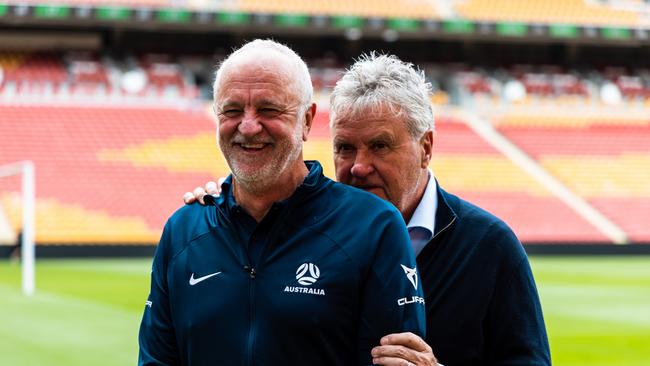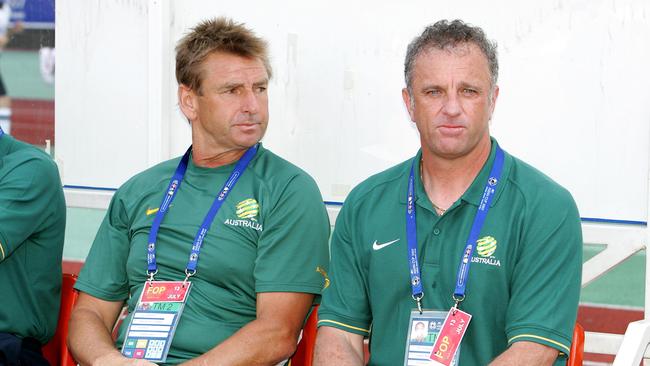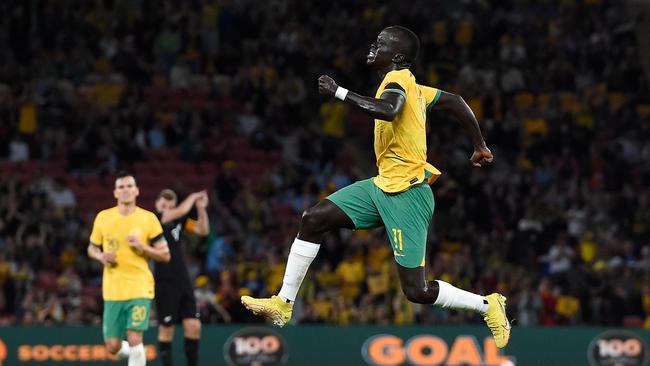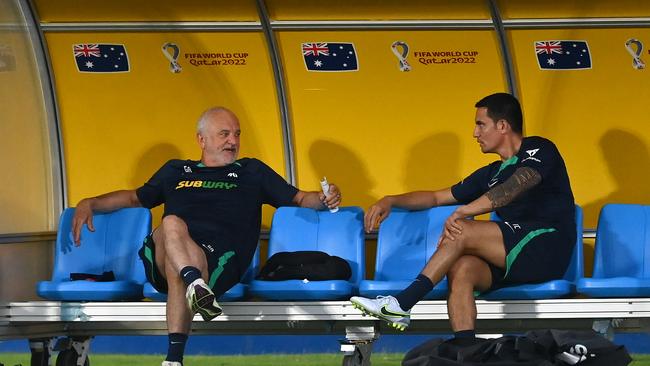Graham Arnold reflects on his changes as a manager, 15 years after Asian Cup disaster
Ahead of the Socceroos opener against France in Qatar, Graham Arnold reveals how he’s developed as a manager and how relationships with his players are as important as ever.

Socceroos
Don't miss out on the headlines from Socceroos. Followed categories will be added to My News.
When Graham Arnold first ventured into the treacherous world of management, empathy was an afterthought.
He wanted to be a military commander. The 2007 Asian Cup, where the Socceroos were raging favourites, was the perfect place to lay down that marker.
Arnold got the job by accident after other candidates pulled out, but felt he was ready after spending 12 months with Guus Hiddink.
Guus was a hard-arse. Guus loved a mind game.
Those methods backfired on Arnold. Badly. The Socceroos crashed out early of a tournament they were meant to win.
15 years later, Arnold has great clarity why.
“In the early part of my coaching career I was an actor,” Arnold tells Code Sports.
“Tried the hard-arse way in 2007 at the Asian Cup, and that clearly didn’t work.
“Didn’t feel natural coaching that way, being a dictator and all that.”
Now on the verge of taking the current crop of Socceroos toward an improbable hope – success at a World Cup – Arnold is the opposite.
Empathy towards his players is key.
Even though many on the outside see a totally different man.

Arnold was widely lampooned for what happened at the 2007 Asian Cup. His reputation, unfairly, never recovered in the eyes of some, despite six domestic trophies at the helm of Central Coast and Sydney FC. No manager in the A League era has won more. He returned to the Socceroos job in 2018 a changed man, and manager.
He needed to be. Just six months in, the Socceroos crashed out of the 2019 Asian Cup, a disaster in a football sense. Yet the moments that followed fulltime put the result in its place.
Seconds after the final whistle, Arnold went onto the pitch in the UAE to console his players. Awer Mabil, the young winger, was sitting on the ground in a trance.
“I went over to Awer and said ‘c’mon, get up, this will make us stronger’,” Arnold recalls.
“He looked at me and said, Arnie, something has happened. Something isn’t right.”
Hours later at the team hotel, Ian Smith, a mentor of Mabil called from Adelaide. Awer’s sister Bor had been killed in a car accident which happened near to when the full time whistle was blown.
Arnold, with team officials, went to Mabil’s room.
“I asked him how he was feeling. He told me he was pissed off, and hates losing. I knew then he didn’t know,” Arnold said.
Arnold told Mabil to give him a hug, and broke the devastating news, cracking Awer’s world into a thousand pieces.
“He fell to the ground, onto my leg, it felt like the grief made him weigh a tonne,” Arnold recalls.
Mabil passed out, and when he came back around, knew he had to call his mum, in Kenya with the news. Arnold stayed with him, close, as mother and son grieved in real time at the loss of Bor.
A few days later, the funeral was in Adelaide, and Arnold attended to support. Awer delivered the eulogy, with Arnold standing by his side, grief everywhere.
“The saddest thing I’ve ever seen,” Arnold says.
With that story in its rightful context, far beyond anything bad that can happen on a football pitch, it filled Arnold’s heart to see how Mabil has got more out of his football since, with a move to Cadiz in Spain’s celebrated La Liga.
And in September, Mabil was the difference maker in the Socceroos contest with New Zealand in Brisbane, unleashing a pile driving shot to win the game.
Arnold stood, arms outstretched, reveling in the player’s moment. For Mabil, raised in a Kenyan refugee camp, it was his first Socceroos goal on Australian soil.
“The players are like my kids,” Arnold says, “I feel more like their father.”

What happened to Mabil and the support Arnold felt he had to give is on the outer extremity of man management, long regarded as the secret ingredient to success.
It was Pim Verbeek, the gentle Dutchman now lost to the world, who opened Arnold’s eyes to a different way.
Sure, Verbeek didn’t get it all right. A questionable team selection allowed a young German side to gallop over the Socceroos in the first game of the 2010 World Cup, but as an assistant, Arnold learnt valuable lessons.
“Working with Pim showed me that if there’s no relationship, there’s no communication or connection,” Arnold says.
“One of the biggest things these days as a coach is not so much the talking but the listening. I’ve learnt a lot on how to listen. Understand them off the field, then listen, communicate, so they can understand the role you want them to play on the field.
“In the first part of my coaching career I didn’t have the trust of the players. Now with the communication with the player you have a greater amount of trust in them.”
After his time with Verbeek and the Socceroos ended in 2010, Arnold went into A League management, driving Central Coast in three successful seasons, then Sydney FC for four.
During this time, Arnold’s reputation in the wider football community landed in two distinct camps.
Loved, primarily by fans of the clubs he coached, and loathed by pretty much every opposition fan.
Arnold would wind opponents up. Take aim at external forces. Whinge about everything and everyone. But never, ever, were his players to blame. Daniel McBreen, a striker who joined Central Coast when Arnold went to the club in 2010, clearly recalls his ways.
“One game in that first year we were awful. Arnie told us that behind closed doors,” McBreen says.
“But publicly he blamed the bad schedule, and had a go at the ref. That all got reported and we were like, ``what are these morons on about in the media, we didn’t have a shot on target!”
“He was hated for stuff like that, but it worked. Us players loved it.”
Even people of his own club would be in the firing line. At Sydney, he berated club officials one night for the sprinklers not going on before a game, making the pitch too sluggish to play. His Sydney players were way below their best that night, and Arnold told them directly behind closed doors. But publicly, it was all down to the bloody pitch.
Such methods, then, go a way to explain why Arnold’s guts twisted all through the pandemic, as World Cup qualification became less and less certain. He was on the verge of losing his job before the June playoffs, after a defeat to Japan in Sydney ruled out automatic qualification. Football Australia CEO James Johnson went to Saudi Arabia, where the Socceroos lost again. But Johnson noticed Arnold’s way with the players. The togetherness. The bond. Arnold survived, just.
Of course, it worked out against Peru, which led to an enormous high, but last week, a low.
Arnold had to call eight players from the Peru squad, and a few more, to tell them they weren’t required for the World Cup.
Speaking a few days before making those calls, Arnold was a long way removed from the hard-arse of days gone by.
“One of the worst days of my coaching career will be telling the players that aren’t selected, to have a dream taken away,” Arnold says.
“Ah … it f**king hurts.

The World Cup acts as a seminal moment for Arnold.
Get it right, and somehow get the Socceroos out of the group, he gets to choose his own next adventure. Deep down, he’s making all the noises of wanting to stay. Walking away would be difficult.
If it goes horribly wrong in the formidable tasks of France, Tunisia and Denmark, Arnold will be the figurehead for failure.
He won’t hear of that option.
In the warm dusk air each night this week, Arnold’s gravelling tone can be heard far away, both demanding, and encouraging.
Arnold knows what his group is capable of. Mainly because he knows himself.
Originally published as Graham Arnold reflects on his changes as a manager, 15 years after Asian Cup disaster





